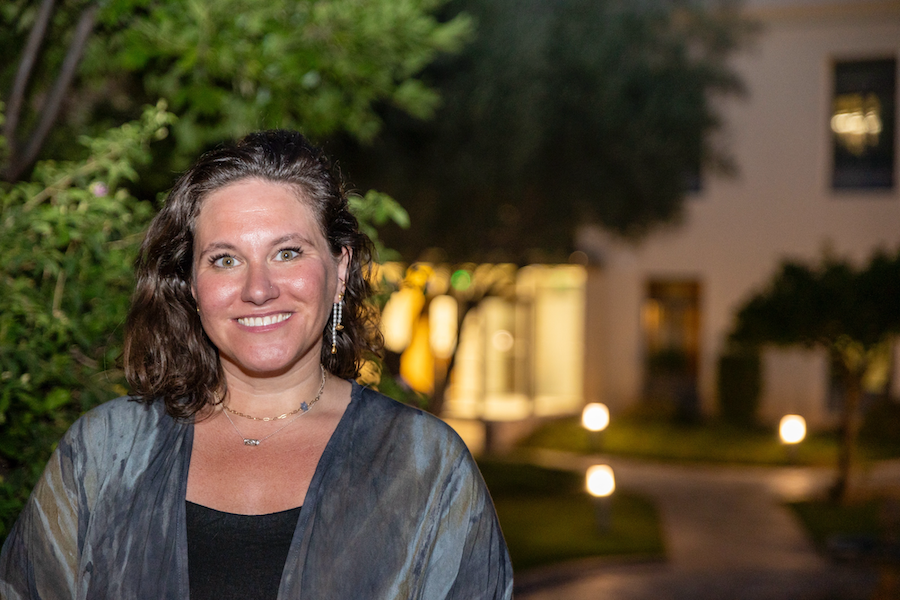Alumni Spotlight: Katie Fine

Katie Fine is a Florida State University alumna who earned her doctoral degree from the Department of Classics in 2021. Fine has worked as a forensic archaeologist for the Department of Defense’s Defense Prisoner of War/Missing in Action Accounting Agency. Currently, Fine is the assistant director of the American School of Classical Studies at Athens, an overseas research institute in Greece, where she has implemented a mental health framework by allocating funds for a school psychiatrist and psychologist to assist students.
Tell us about your background, where you're from and what brought you to FSU.
I’m originally from Chicago and completed my bachelor’s degree at Northwestern University in 2009. I earned my master's degree from University College London in England in 2011 and my doctoral degree from FSU in 2021, two years of which I spent working on my doctoral studies at the American School of Classical Studies at Athens.
After earning my master’s degree, I decided I wanted to work in prehistory. I did more research and wanted to work with Daniel Pullen, recently retired FSU Classics professor, on his research in prehistoric societies, which led me to FSU. When I was accepted into the program, I visited Tallahassee and thought the campus was lovely, but what really drew me to FSU was that the students seemed truly interested in their work and being a community.
What inspired you to pursue archeology?
Growing up in Chicago, I was lucky enough to have many museums nearby. I used to go on field trips to the Art Institute of Chicago and to the Field Museum where there are permanent collections of Egyptian artifacts and ancient art. I was completely hooked and wanted to learn as much as I could about the people that came before us and their daily lives — and I still do.
Tell us about your FSU dissertation. Did this teach you any important lessons you carry with you today?
My dissertation explored neolithic ritual practices and how ceramics can be used to understand people's choices and movements. I looked at a lot of research on identifying rituals in the archaeological record and how we identify collections of practices. The skills I developed writing my dissertation are directly applicable to the rest of my life, professionally and personally. You must have confidence in what you're writing so you can convince other people why your topic is important.
Tell me about being a forensic archaeologist for the Department of Defense.
While I was finishing my dissertation, I worked for the Defense POW/MIA Accounting Agency for two years. Our mission was to recover the remains of American service members who died during various international conflicts, mostly World War II and Vietnam. I served as the scientific recovery expert on several missions, meaning I was the only civilian on these military teams. Getting the opportunity to repatriate service members and bring their family closure was an amazing experience.
Tell us about your experiences as the assistant director at the American School of Classical Studies at Athens.
As the assistant director, I help oversee the basic operations of the school. I wear a lot of different hats from facilitating visits, giving presentations and assisting students with various tasks. I'm constantly trying to make sure things are running well and ensuring our students and scholars have all the resources they need.
What are some goals or projects that you worked on?
I’ve started to institute a mental health framework for our students and scholars at the American School of Classics. I was able to successfully advocate for wellness spending in our yearly budget, and this wellness spending was used for a student psychiatrist, a psychologist, and fun wellness activities such as yoga classes.
When I was a doctoral student at the American School of Classics, I had to balance having the greatest adventure in Athens with how hard I was working on my dissertation. When I became assistant director, it was important to me to provide students with support, and I’m very proud of the changes I’ve made.
What aspect of your areas of study did you find most rewarding?
I love teaching, and that's something I identified while I was given the opportunity to teach as a doctoral candidate at FSU. I love connecting with students and sharing ideas with others. I get to connect with people, hear their experiences and share mine.
What on-campus resources helped you achieve success?
As a big advocate for mental health and wellness, I relied heavily on the Counseling and Psychological Services where I was part of a graduate student women’s group. It was so important for me to have this free and easily accessible resource. I cannot overstate the importance of those kinds of resources, especially for graduate students.
Are there any faculty or staff who have helped or inspired you?
FSU classics professor and archaeologist Daniel Pullen, my adviser during my time at FSU, was a big inspiration to me. I was so excited when they accepted me into the classics program to work with him on his research focusing on the prehistoric Aegean region and the emergence of complex societies. Overall, the Department of Classics was amazing — FSU has talented faculty and wonderful staff.
Even though you might miss FSU, what are you looking forward to now?
I have a lot of travel coming up, so I'm excited about that. I'm leading a trip to Croatia in March where I'll be touring and teaching scholars. I've done a lot of field work there, so I'm looking forward to returning. I’m also traveling to Italy and northern Greece to do some of my own research. I'm working on a project about the Ashkenazi Jewish community in Greece, and that's something I'm extremely excited about!
